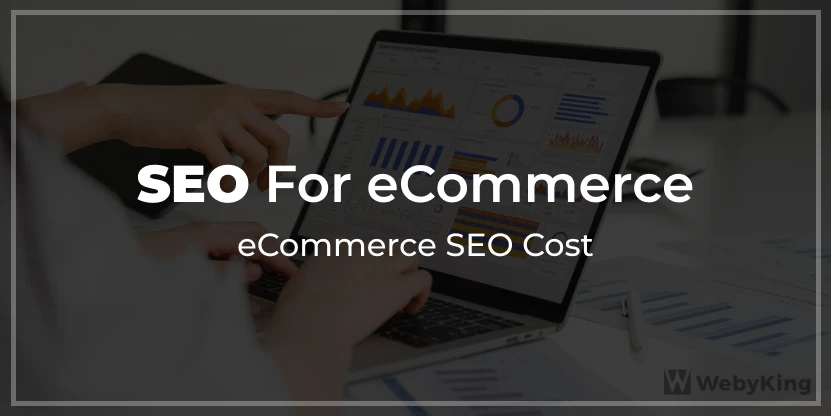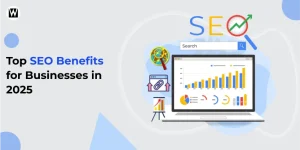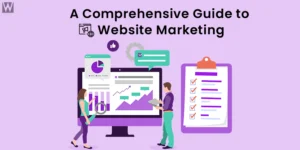How Much Does eCommerce SEO Cost in 2026? Pricing, Factors & Budget Planning

- What is eCommerce SEO and Why It Is Important?
- Top eCommerce SEO Best Practices
- How to Perform an eCommerce SEO Audit
- How Much Does eCommerce SEO Cost in 2026? Pricing, Factors & Budget Planning
- Technical SEO for eCommerce: Complete Optimization Guide for Scalable Growth
- Should You Hire an eCommerce SEO Expert or Do It Yourself?
- eCommerce SEO Trends to Watch in 2026 (Strategic Guide for Online Stores)
Get In Touch
TL;DR:
Most eCommerce websites spend between $800 and $5,000 per month on SEO, while enterprise stores often invest $8,000–$20,000+ monthly, depending on competition, site size, and growth goals.
The cost ranges in this guide are based on common market pricing patterns observed across Shopify, WooCommerce, and Magento eCommerce projects.
eCommerce SEO is the process of optimizing an online store’s product, category, and technical structure to improve visibility in organic search results.
This guide breaks down the typical cost of eCommerce SEO for online stores in 2026, what factors influence pricing, and how to plan a realistic SEO budget.
It’s designed for founders, marketers, and decision-makers to compare average eCommerce SEO costs, monthly investments, and long-term value.
You’ll learn how pricing varies by store size, service scope, and competition—so you can budget confidently.
eCommerce SEO Pricing Snapshot (Quick Overview)
| SEO Type | Typical Cost Range |
|---|---|
| SEO Audit (One-time) | $300 – $2,000 |
| Monthly eCommerce SEO | $800 – $5,000+ |
| One-time SEO Projects | $500 – $10,000+ |
| Enterprise SEO | $8,000 – $20,000+/month |
These pricing ranges reflect market averages. Actual costs vary by provider, competition, store size, and scope of work.
Factors That Affect eCommerce SEO Pricing
- Website size (number of products and pages): The larger the website, the more optimization work is required, which increases SEO costs.
- Competition level within your niche: Competitive markets require stronger strategies and higher investment to achieve a ranking.
- Current SEO condition of the website: Websites with weak SEO foundations need more fixes and long-term effort.
- eCommerce platform (Shopify, WooCommerce, Magento, custom): Some platforms require more technical customization and development work.
- Target markets (local, national, or international): Local, national, and international SEO campaigns vary in complexity and cost.
eCommerce SEO Pricing Models
- Hourly pricing: Best for short-term SEO tasks or consultations.
- Monthly retainer: Ongoing SEO management with consistent optimization.
- Project-based pricing: Fixed-scope SEO work with one-time costs.
- Performance-based pricing: Payment tied to agreed performance benchmarks.
eCommerce SEO Service Cost Breakdown (High-Level)
| eCommerce SEO Component | Typical Cost Range |
|---|---|
| Technical SEO | $1,000 – $10,000 |
| On-Page SEO | $500 – $5,000+ |
| Content SEO | $100 – $500 per page |
| Link Building | $100 – $1,000+ per link |
| Ongoing SEO | $800 – $5,000+/month |
Costs depend on site complexity, competition level, and ongoing effort.
Typical SEO Budget by Store Size
Small eCommerce Stores (Low Competition)
- Monthly investment: $500 – $1,500
- Scope level: Light
Suitable for startups and niche stores focusing on foundational SEO and early growth.
Mid-Size eCommerce Stores (Growing Catalogs)
- Monthly investment: $1,500 – $4,000
- Scope level: Moderate
Ideal for brands expanding product categories, content production, and organic visibility.
Enterprise eCommerce Stores (Large or Global)
- Monthly investment: $8,000 – $20,000+
- Scope level: Advanced
Required for competitive markets, large catalogs, international SEO, and continuous optimization.
Regional Pricing Differences
SEO pricing for eCommerce websites can also vary by geography and service provider type.
- North America & Europe: Higher pricing due to competition and operating costs
- Asia / India: More cost-effective SEO options with a wide range of expertise
- Freelancers vs Agencies: Freelancers cost less; agencies offer scalability and cross-functional expertise
What’s Usually Included vs Excluded
Common Inclusions
- Technical and on-page SEO optimization
- Keyword research
- SEO performance tracking and reporting
- Ongoing optimization support
Common Exclusions
- Paid advertising management
- Conversion rate optimization (CRO)
- Website development or redesign
- Creative design or product photography
How to Plan an eCommerce SEO Budget
- Minimum recommended investment: Around $800/month for meaningful progress
- Expected timeline for results: Typically 3–6 months; longer in competitive niches
- Planning approach: eCommerce SEO delivers the strongest ROI when treated as a long-term growth channel rather than a short-term expense
Your budget will also depend on whether you handle SEO internally or work with experienced professionals.
If you’re unsure where to begin, an initial eCommerce site audit can help identify gaps and clarify priorities before committing to ongoing support.
Beyond current needs, search behavior and algorithms continue to change, so keeping up with industry shifts helps businesses plan more effectively and avoid outdated strategies.
Final thoughts
eCommerce SEO pricing in 2026 varies widely based on your store’s size, competition, and growth objectives. While lower-cost options may work for early-stage stores, long-term success typically requires consistent investment and strategic execution.
Instead of focusing solely on price, evaluate what level of eCommerce SEO services aligns with your catalog size, market competitiveness, and revenue goals. A realistic budget paired with ongoing optimization is more likely to deliver sustainable organic visibility and qualified traffic over time.
FAQs on eCommerce SEO Audit
Why is eCommerce SEO more expensive than regular SEO?
eCommerce SEO costs more than regular SEO because it involves large product catalogs, advanced technical SEO, frequent content updates, and ongoing optimization across hundreds or thousands of product and category pages.
How long should I invest in eCommerce SEO?
Most eCommerce businesses invest in SEO for at least 6–12 months, as organic growth typically takes several months to gain traction and longer in competitive markets.
Is cheap eCommerce SEO worth it?
Cheap eCommerce SEO is often not effective because it lacks the depth, consistency, and strategic execution needed to compete in search results, especially for product-driven websites.
How much does eCommerce SEO cost per month?
Most eCommerce SEO services cost between $800 and $5,000 per month, while enterprise-level SEO can exceed $8,000–$20,000 per month depending on competition, store size, and goals.
Is eCommerce SEO a one-time cost or an ongoing investment?
eCommerce SEO is an ongoing investment because search algorithms, competitors, and product inventories constantly change, requiring continuous optimization and performance monitoring.
What affects eCommerce SEO pricing the most?
The biggest factors affecting eCommerce SEO pricing are website size, competition level, current SEO health, target markets, and the scope of services required.

![How Much Does An Ecommerce Website Cost In 2026 [A Complete Pricing Guide] Featured Image of eCommerce Website Cost](https://www.webyking.com/wp-content/uploads/2021/12/ecommerce-website-cost-300x150.webp)














